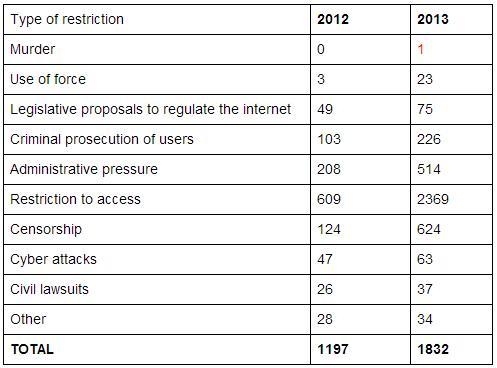Last week, the AGORA Association gave the world its annual gift of an overview of the state of internet freedom in Russia: read it in full here.
A quote from Pope Francis -- "Internet is a Gift from God" -- sets the tone for the report by the Kazan-based interregional human rights group that mostly consists of lawyers who are representing the 'who's who' of Russian dissent these days: Navalny the Blogger, Pussy Riot art collective, the "Bolotnaya square" prisoners, and many more. The Internet freedom report is a special treat from AGORA, which has been monitoring the rights of Russian Internet users for eight years now.
The Russian government has shown a strong commitment to making the Internet faster and cheaper, unfortunately they also have a few ideas about making it "better." That leads to problems. Many problems. With more than a half million new domain names registered in the Runet (Russian+Internet) and a healthy 14 percent growth in the number of daily users, the Internet is destined to defeat television as Russia's primary source of information.
The TV is largely state-controlled and a great source of pride & power for the Kremlin while Internet users are roaming free, venting their dissatisfaction and reading all sorts of questionable stuff that could be burned, banned, and forgotten if a copy of it appeared in your local library in, say, Novosibirsk. Which means it's on for the government. So AGORA warns you outright that "the situation with the Internet freedom in Russia worsened significantly during the past year."
Last year, AGORA talked about Russia as a global threat to Internet freedom. It appears Edward Snowden's revelations have adjusted the Internet freedom-fighters' thinking a bit, as now "not only Russia or China endeavor to establish a total control of the information flows but democratic governments too do not mind keeping track of their citizens."
So if Russia’s not the global worm eating the spirit of Internet on the inside of the tubes, what has the Kremlin been up to in 2013?
The city of Moscow continues its dominance in the sad regional scorecard, but the murder case comes from the North Caucasus, to nobody’s surprise. After surviving an assassination attempt in January and receiving multiple death threats over the years, journalist Ahmednabi Ahmednabiyev was gunned down in the southern region of Dagestan. He was the 17th journalist killed since 1992.
Impunity reigns in the investigation of other violent crimes against web-based media journalists and Internet activists. In six cases reported by AGORA, the attackers reportedly were law enforcement personnel.
On the social networks, Russia's Facebook's brother-from-another-mother VK, or Vkontakte, continues to wave goodbye to users who are prosecuted for their posts. At least 30 criminal cases began after posts, compared to 50 in 2012. The story of Maxim Yefimov stands out: the Karelian blogger was overtly critical of the state of church-state relations in the region and had to flee Russia, seeking asylum in Estonia.
Behind these dramatic examples, there are hundreds of cases of access restrictions, cyber attacks, censorship, legislative proposals to regulate the Internet, and administrative fines to both users and providers. AGORA recorded 1,832 instances of Internet freedom restrictions last year, a remarkable rise in abuse compared to 2012’s 1,197 incidents. Here’s their break-down of the situation:
The whole lot of this may feel like apples and oranges thrown into one bucket: the one case of murder is infinitely more significant than restricting access to 2,369 users. Yet the numbers are up across the board and add up to very bad news for Russia’s growing Internet community.
In 2014, AGORA expects to see more of extrajudicial blocking of information, more and improved technical facilities for control and tracing, and new efforts to divide and conquer the Internet by keeping the users engaged in their national networks.
